News
Boys & Girls Soccer Recap 10/18
Metch '25 shares the following recap of the BUA Boys Soccer team victory against Commonwealth at Fall Festival on October 18:
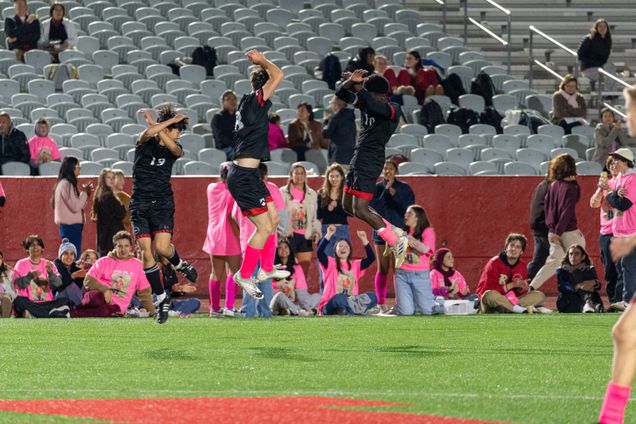 Boston University Academy took the lead early, with Ollie '25 opening up the scoreboard by tapping in a corner kick to make it 1-0 in the first half. Commonwealth fought fiercely, locking down BUA's offense until the second half. Then, Austin '28 dazzled by weaving through five defenders down the right, delivering a perfect assist to Connor '25 at the far post, who tapped it in beautifully. Caleb '27 followed with a stunning far-post strike from a tough angle, extending the lead to 3-0 with just ten minutes left.
Boston University Academy took the lead early, with Ollie '25 opening up the scoreboard by tapping in a corner kick to make it 1-0 in the first half. Commonwealth fought fiercely, locking down BUA's offense until the second half. Then, Austin '28 dazzled by weaving through five defenders down the right, delivering a perfect assist to Connor '25 at the far post, who tapped it in beautifully. Caleb '27 followed with a stunning far-post strike from a tough angle, extending the lead to 3-0 with just ten minutes left.In the final moments, Commonwealth launched a relentless attack, pinning BUA in their half. But with 30 seconds remaining, Nathan '28 made a crucial defensive stop, passing to Connor '25, who one-touched it to Caleb '27. Caleb then curved a perfect pass to Metch '25, who sealed the match with an incredible team-driven goal, ending the game 4-0 in style.
Alex '25 and Rose '25 penned the below recap of the Girls Soccer team's Fall Festival win, also on October 18:
 The night was young. The vibes were high. Last Friday, BUA battled Commonwealth on our home turf for our annual Fall Fest. Senior Night left the girls with a strong sense of team spirit and bittersweet determination, as we honored senior players, Lani '25, Sahithi '25, Corinna' 25, Eesha '25, Rose '25, and Alex '25. The girls fought hard to get ahead in the first half, initially finding little luck. The team’s goalie, Maggie '27, held the fort down with stupendous saves as the girls shook off their nerves and “locked in,” as the kids would say. In a wave of freshman greatness, Skye '28 sent a beautifully placed cross to meet Sarah '28 in the box, who saw her chance and took it, scoring to win the game! BUA held off Commonwealth with a newfound energy, pressing on offense and closing down on defense. What truly made the game special was not only the girls’ excitement to play, but the BUA’s excitement to watch. The crowd’s cheers, posters, and smiles dominated the field, creating a perfectly joyful environment for victory. Thanks BUA and roll Terriers!
The night was young. The vibes were high. Last Friday, BUA battled Commonwealth on our home turf for our annual Fall Fest. Senior Night left the girls with a strong sense of team spirit and bittersweet determination, as we honored senior players, Lani '25, Sahithi '25, Corinna' 25, Eesha '25, Rose '25, and Alex '25. The girls fought hard to get ahead in the first half, initially finding little luck. The team’s goalie, Maggie '27, held the fort down with stupendous saves as the girls shook off their nerves and “locked in,” as the kids would say. In a wave of freshman greatness, Skye '28 sent a beautifully placed cross to meet Sarah '28 in the box, who saw her chance and took it, scoring to win the game! BUA held off Commonwealth with a newfound energy, pressing on offense and closing down on defense. What truly made the game special was not only the girls’ excitement to play, but the BUA’s excitement to watch. The crowd’s cheers, posters, and smiles dominated the field, creating a perfectly joyful environment for victory. Thanks BUA and roll Terriers!
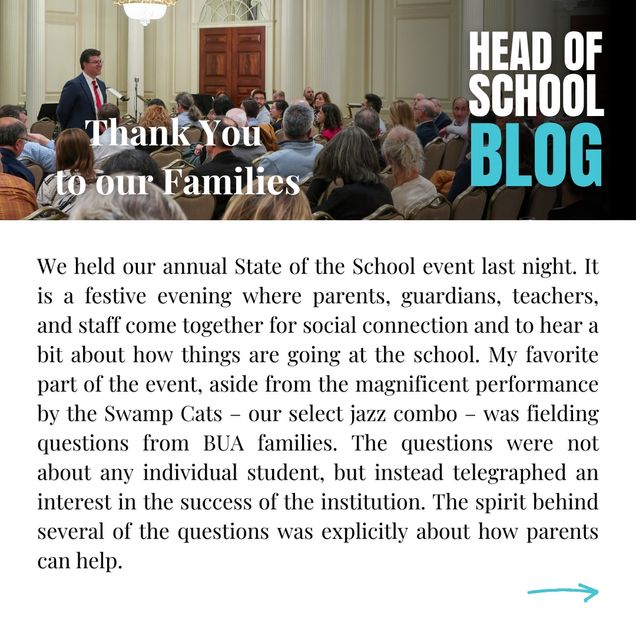
Thank You to our Families
We held our annual State of the School event last night. It is a festive evening where parents, guardians, teachers, and staff come together for social connection and to hear a bit about how things are going at the school. My favorite part of the event, aside from the magnificent performance by the Swamp Cats – our select jazz combo – was fielding questions from BUA families. The questions were not about any individual student, but instead telegraphed an interest in the success of the institution. The spirit behind several of the questions was explicitly about how parents can help. What kind of social entrepreneurship opportunities are available to students and how can parents open more doors? As the school builds more partnerships in the City of Boston, what role can parents who live in Boston play?
This school is fortunate to have such dedicated and generous families. Each year, dozens of parents and guardians volunteer across multiple areas of school life: admissions, parent network gatherings, teacher appreciation, the advisory board, chaperoning school events, and more. 86% of families last year made the school a philanthropic priority and made a gift to the school’s Annual Fund – in addition to their investment in tuition. Those funds underwrite all of our faculty-staff professional development efforts, bolster our financial aid program, and enhance our academic, athletic, and extracurricular offerings. In the coming weeks, we will roll out a new way for parents and guardians to help: informational interviews, shadow days, and career panels for recent BUA graduates just getting started on their professional journeys. To all of you who keep finding ways to give back, thank you.
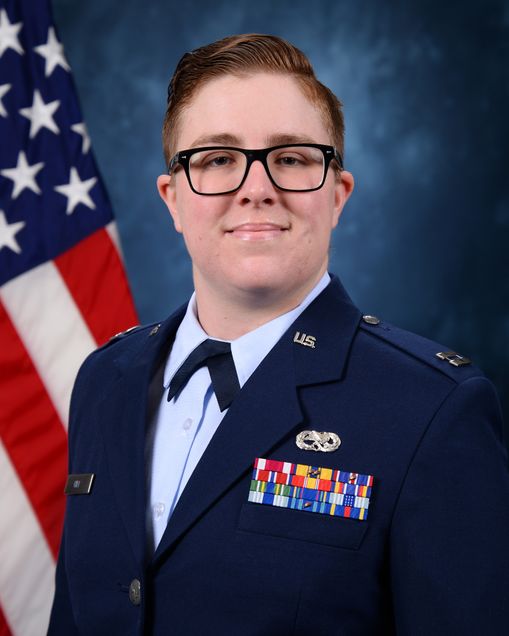
Major Lydia Hill ’11 Receives Distinguished Alumni Award
 BUA is delighted to present the 2024-2025 Distinguished Alumni Award to Major Lydia Hill '11 for her service in the United States Air Force as well as for her advocacy on behalf of LGBTQIA airmen.
BUA is delighted to present the 2024-2025 Distinguished Alumni Award to Major Lydia Hill '11 for her service in the United States Air Force as well as for her advocacy on behalf of LGBTQIA airmen.
This annual award, launched in 2022, goes to an alumnus/a who best exemplifies the values of BUA and has used those qualities to make an impact on the community and world around them. Nominations for the award are solicited from the entire alumni community, and recipients are selected by the BUA Alumni Council.
Major Hill graduated from BUA in 2011 and went on to the United States Air Force Academy, where she received her commission in 2015 as a distinguished graduate. Major Hill left her own legacy at USAFA, founding the Spectrum Alliance for LGBTQIA cadets, which is still in operation today. Major Hill has worked with KC-135s and F-16s as an Aircraft Maintenance Officer, served as a Wing Executive Officer, has deployed in support of named operations worldwide, and been stationed in England, South Korea, Illinois, and San Diego. She holds two master’s degrees: an MA in Psychology from San Diego State and an MA in Professional Counseling from Lindenwood University. Major Hill currently serves as an Instructor in the Department of Behavioral Sciences and Leadership at the Air Force Academy in Colorado Springs, Colorado.
Major Hill has maintained her connection to BUA. In 2021, she returned to address the community at a Veterans Day all-school meeting. In her remarks, Major Hill spoke openly about mental health issues, LGBTQIA inclusion, and leading a life of service. She reflected on BUA as being “the first place I really saw people step up and be agents of change,” and shared her gratitude for a BUA teacher who inspired her “by living his life openly and with courage.” Major Hill’s candid reflections received an enthusiastic reception from the BUA audience, with students expressing their deep appreciation in the Q&A following her talk.
We are grateful to Major Hill for her service and for her commitment to BUA, and look forward to welcoming Lydia back to campus this year to celebrate her many accomplishments.
Keep your eyes peeled for the Fall 2024 edition of Odyssey, the magazine of Boston University Academy, which includes an in-depth Q&A with Lydia on her BUA experience, her career, and what winning the Distinguished Alumni Award means to her.
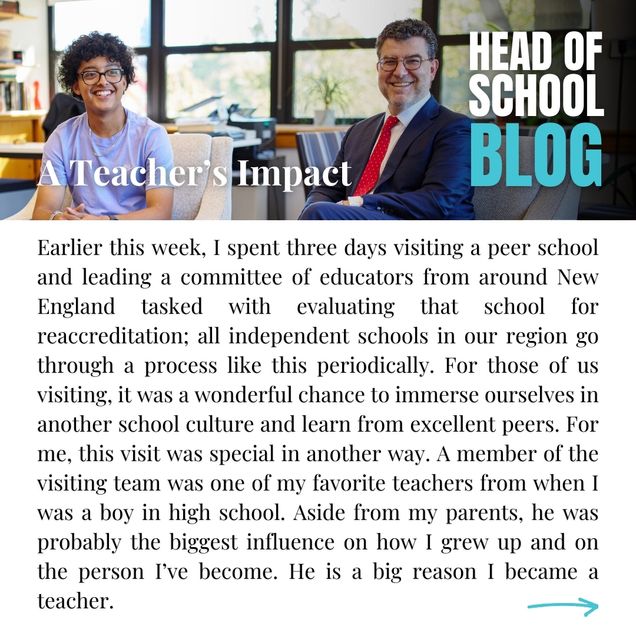
A Teacher’s Impact
Earlier this week, I spent three days visiting a peer school and leading a committee of educators from around New England tasked with evaluating that school for reaccreditation; all independent schools in our region go through a process like this periodically. For those of us visiting, it was a wonderful chance to immerse ourselves in another school culture and learn from excellent peers. For me, this visit was special in another way. A member of the visiting team was one of my favorite teachers from when I was a boy in high school. Aside from my parents, he was probably the biggest influence on how I grew up and on the person I’ve become. He is a big reason I became a teacher. We have stayed in touch over the years, which has mostly consisted of me asking for advice. I have just recently made the transition to calling him by his first name! Our relationship is different now, but I still find so much comfort in his support, friendship, and love.
Last weekend, we hosted an event for BUA alumni from the 1990s – the first generation of the school’s life. In the early stages of our planning, we wondered how we would convince the graduates to come back. Our answer: bring back their teachers. Giants in the life of the school walked the halls again – teachers from the early years like Mark Davies, John Talbot, Megan Staples, Sandra Michelman, Catherine Pollock, and Rich Horn, people who helped shape the curriculum and culture we now steward. In one touching moment, an alumna gave a copy of her recently-published book of poetry to one of those teachers as a recognition of the role he played at the start of her literary journey. She is now a professor of literature, passing it on to the next generation.
The historian Henry Adams once wrote that “A teacher affects eternity; he can never tell where his influence stops.” Perhaps it never does. These moments made me even more grateful for the dedicated and talented teachers I work with every day here and who will be lifelong mentors for this generation of BUA students.
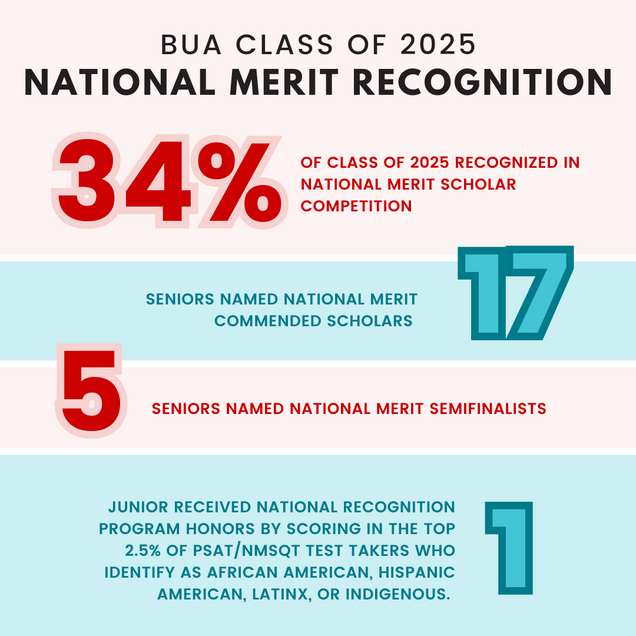
BUA Seniors Earn National Merit Honors
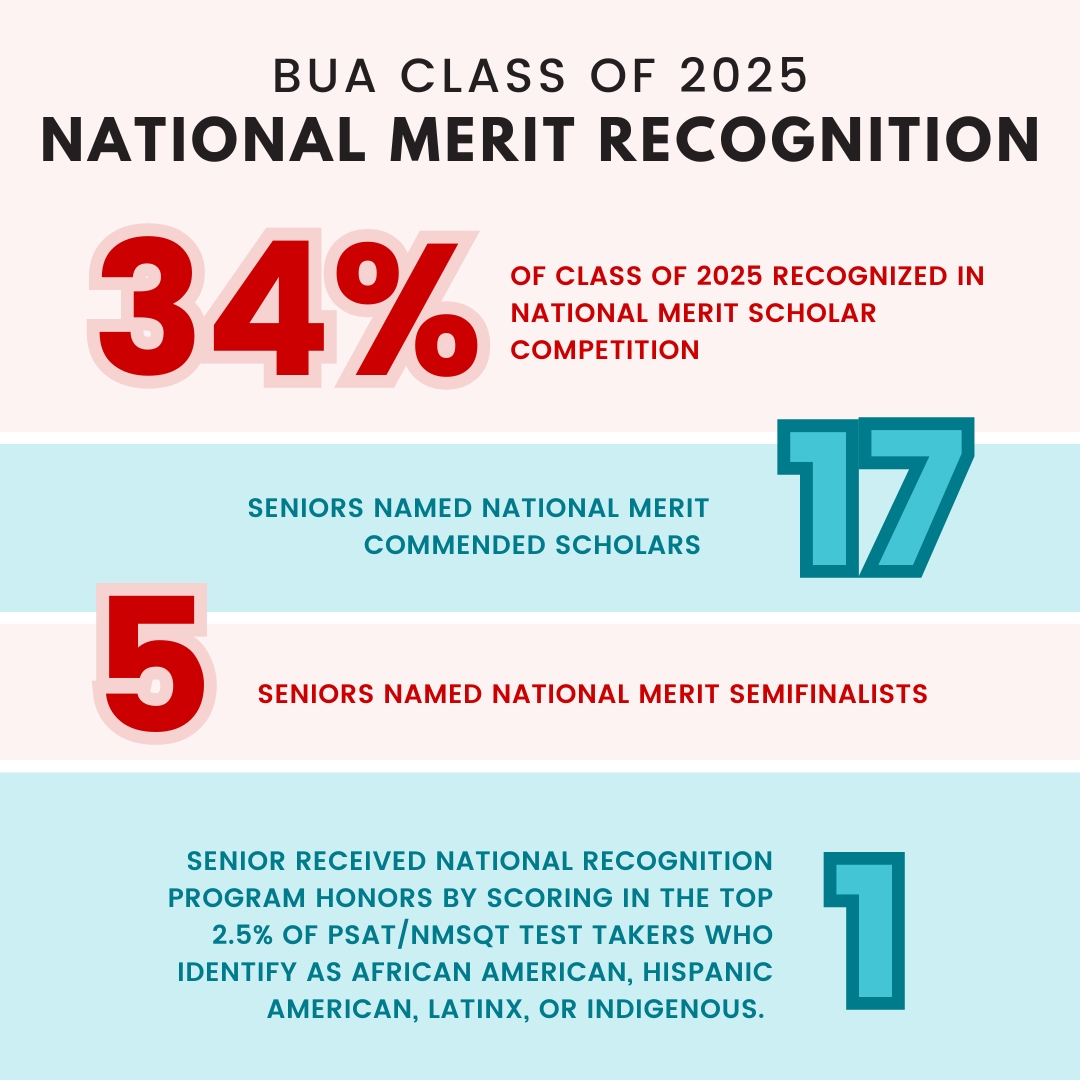
Thirty-four percent of the Boston University Academy Class of 2025 received recognition in the 70th annual National Merit Scholarship Program competition. The competition honors the nation’s scholastic champions and recognizes exceptional academic promise in high school seniors nationwide.
Seventeen current BUA seniors were named National Merit Commended Scholars. Out of these 17 Commended Scholars, five BUA seniors were named National Merit Semifinalists, placing them among the top 1% of all US high school seniors who entered the competition.
Over 1.3 million juniors in about 21,000 high schools entered the 2025 National Merit Scholarship Program by taking the 2023 Preliminary SAT/National Merit Scholarship Qualifying Test (PSAT/NMSQT). The nationwide pool of Semifinalists includes the highest-scoring entrants in each state.
Semifinalists will have the opportunity to compete for one of 2,500 National Merit $25,000 Scholarships. National Merit Scholar finalists will be announced in February of 2025.
One member of the BUA Class of 2025 received College Board National Recognition Program honors by scoring in the top 2.5% of PSAT/NMSQT test takers who identify as African American, Hispanic American, Latinx, or Indigenous.
Congratulations to all of BUA’s honorees on this well-deserved recognition!
Cross Country Recap: 10/1
Ada '25 shares a recap of the BUA Cross Country team's race on October 1, 2024:
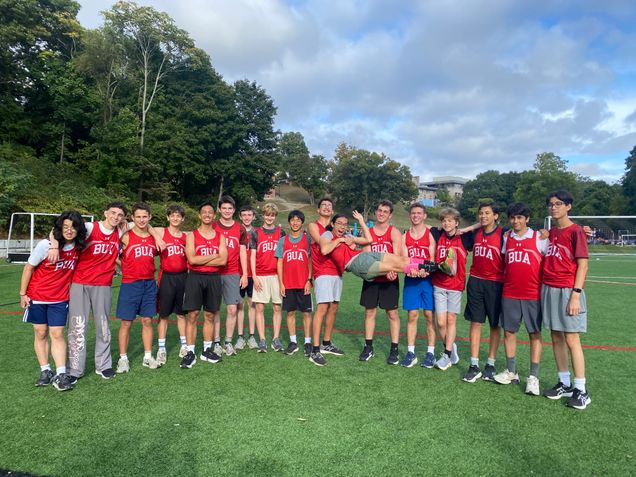 The cross country team crushed another hilly race at BISB this past Tuesday! The course started with an uphill battle, leading the runners into a partially wooded trail, and eventually back onto a pavement stretch. In honor of the course’s three laps, I’d like to give three special shoutouts. First, congratulations to freshmen Maya '28, James '28, Neil '28, Jonathan '28, and Yusuf '28 for showing up and putting their all into this race! Their hard work this season shone through in their fierce starts, and their cheers for one another kept them going throughout the course. Second, a special shoutout to Daphne ’25 for an especially strong finish. Coming into the final stretch of the race, Daphne was neck and neck with another runner—with a final pump to the gas, she sprinted towards the chute and came out victorious. And a final shoutout to our supportive coaches Ms. Kamen and Ms. Cox for continuing to foster an encouraging environment throughout the season. Despite our frequent pre-race nerves, they have lifted team spirits and continue to inspire our runners to push their limits. From students to faculty, Go Terriers!
The cross country team crushed another hilly race at BISB this past Tuesday! The course started with an uphill battle, leading the runners into a partially wooded trail, and eventually back onto a pavement stretch. In honor of the course’s three laps, I’d like to give three special shoutouts. First, congratulations to freshmen Maya '28, James '28, Neil '28, Jonathan '28, and Yusuf '28 for showing up and putting their all into this race! Their hard work this season shone through in their fierce starts, and their cheers for one another kept them going throughout the course. Second, a special shoutout to Daphne ’25 for an especially strong finish. Coming into the final stretch of the race, Daphne was neck and neck with another runner—with a final pump to the gas, she sprinted towards the chute and came out victorious. And a final shoutout to our supportive coaches Ms. Kamen and Ms. Cox for continuing to foster an encouraging environment throughout the season. Despite our frequent pre-race nerves, they have lifted team spirits and continue to inspire our runners to push their limits. From students to faculty, Go Terriers!
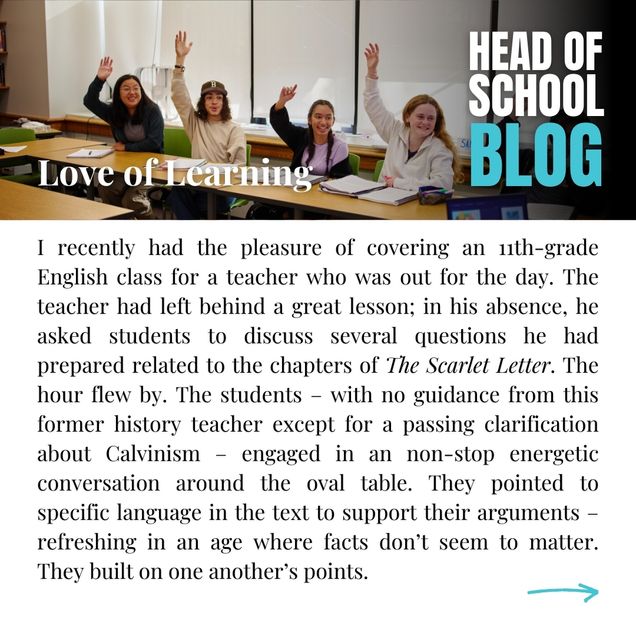
Love of Learning
I recently had the pleasure of covering an 11th-grade English class for a teacher who was out for the day. The teacher had left behind a great lesson; in his absence, he asked students to discuss several questions he had prepared related to the chapters of The Scarlet Letter. The hour flew by. The students – with no guidance from this former history teacher except for a passing clarification about Calvinism – engaged in an non-stop energetic conversation around the oval table. They pointed to specific language in the text to support their arguments – refreshing in an age where facts don’t seem to matter. They built on one another’s points. They asked one another questions: “How did you all interpret the narrator’s description of . . . .” When they challenged one another, they did so with respect: “I didn’t see that. Where in the chapter did you pick that up?” Nearly everybody spoke up, and those on the quieter side were deeply engaged. It was serious. It was fun. And it was all driven by the kids.
What I saw was no accident. Those students came to BUA because they wanted to be surrounded by peers like them who enjoy discussing literature, and history, and math, and any number of subjects. They have spent two years and some months now in classrooms learning together and under the tutelage of wonderful teachers who fan their passions and help them understand how to engage productively around the table. The result is the classroom atmosphere I witnessed – where young people genuinely love learning and take ownership of the experience, joyfully.
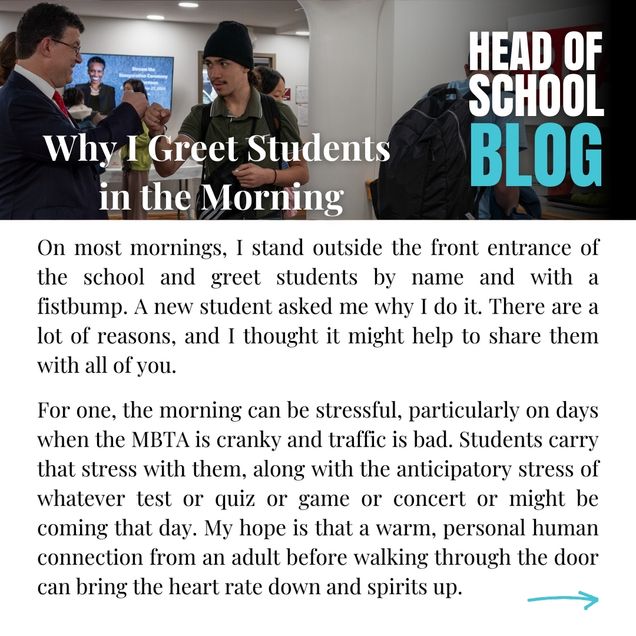
Why I Greet Students in the Morning
On most mornings, I stand outside the front entrance of the school and greet students by name and with a fistbump. A new student asked me why I do it. There are a lot of reasons, and I thought it might help to share them with all of you.
For one, the morning can be stressful, particularly on days when the MBTA is cranky and traffic is bad. Students carry that stress with them, along with the anticipatory stress of whatever test or quiz or game or concert or might be coming that day. My hope is that a warm, personal human connection from an adult before walking through the door can bring the heart rate down and spirits up. There’s something psychologically important about being seen, called by name, and welcomed as an individual. And there’s something comforting in the consistency of the ritual at the start of the day. Greeting students like this is a way I can do my part to live up to our promise to know and love each young person.
There are other benefits too. It never hurts to give students a chance to practice eye contact, say hello, and engage in a little conversation. I’ll often learn something: there’s a 10th grade English quiz coming up or it’s somebody’s birthday. In the process, I’m hopefully laying the groundwork so that if students have something sensitive to share with me in the future, they are comfortable doing that.
The most important reason, though – and the one I told that new student – is that greeting them is often the best part of my workday. These kids are just so great. I come back into the building for first period energized and carrying a daily reminder of what this work is all about.
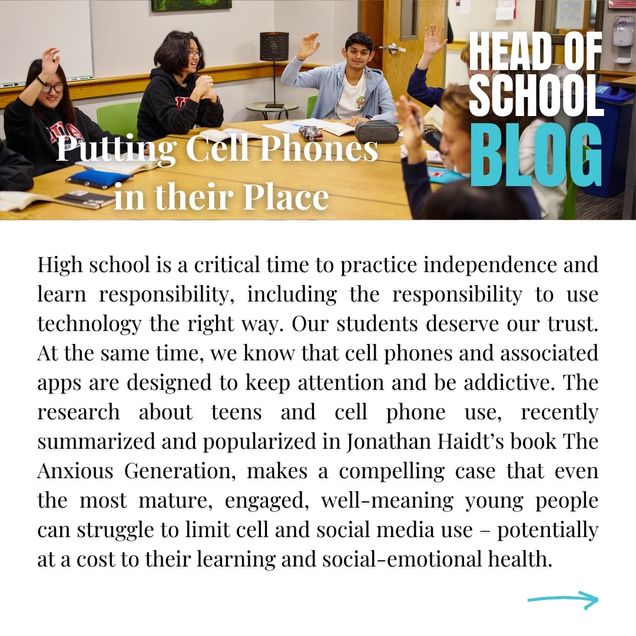
Putting Cell Phones in their Place
High school is a critical time to practice independence and learn responsibility, including the responsibility to use technology the right way. Our students deserve our trust. At the same time, we know that cell phones and associated apps are designed to keep attention and be addictive. The research about teens and cell phone use, recently summarized and popularized in Jonathan Haidt’s book The Anxious Generation, makes a compelling case that even the most mature, engaged, well-meaning young people can struggle to limit cell and social media use – potentially at a cost to their learning and social-emotional health.
BUA classes have long been a place of deep, face-to-face engagement between peers and between students and teachers. To honor that tradition, we have created cell-phone-free classroom environments this year. Students now place their phones in a cell-phone caddy at the start of each class. Phones remain there for the duration of the period, unless a teacher asks students to use them for an activity. Students pick up their phones at the end of the class. For safety and practical reasons, most will have their phones with them as they commute to and from school, walk Commonwealth Avenue, and in their BU classes. But BUA classes will be an oasis.
I have talked to school leaders around the country who adopted policies like this in the past few years. To a person, they report that after an adjustment period, students land somewhere between no-big-deal acceptance and gratitude to be free of the devices. We are already seeing that shift here, and I’m glad.
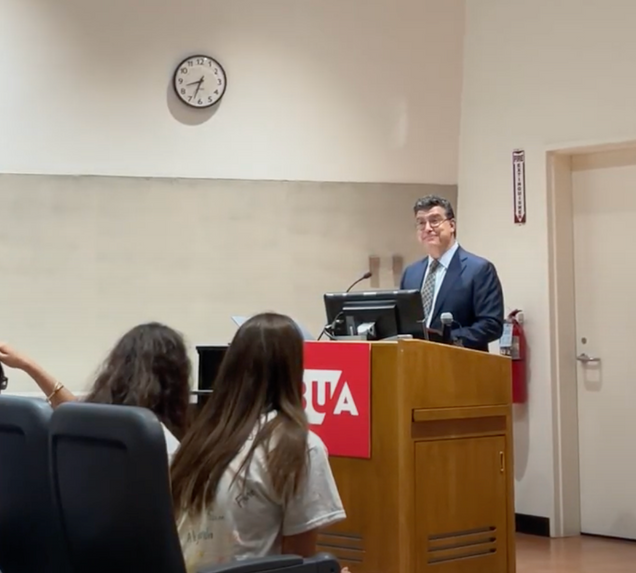
On Civil Discourse: Head of School Chris Kolovos Delivers Opening-of-Term Address
On Tuesday, September 3, 2024, Boston University Academy Head of School Chris Kolovos welcomed students, faculty, and staff back to school with opening remarks on the topic of civil discourse. Read the full text of his remarks below.
Good morning. On behalf of the faculty and staff, welcome to the 32nd year of Boston University Academy.
A special welcome to our new students. You are impressive individuals, but what binds you together and connects you to all of us is your kindness and your curiosity. You will make us better, and we are so glad you're here. To the Class of 2025, welcome back. We had some fun together at the senior retreat. You will set the tone for all of us this year, and we are excited about your leadership. Speaking of seniors, in a few moments I will have the pleasure of introducing Alex Furman, your Student Council President. Before that, though, I will offer some thoughts as I do at the start of each term. My comments today are on the topic of civil discourse.
Two Justices
One of my favorite courses in law school was constitutional law. In preparation for each class, we would read a Supreme Court opinion. Like in the movies, the professor would then stand in front of the room and call on students, asking a series of hard questions about the case. Cases involved redistricting, free speech, abortion, affirmative action, war powers, and so on. Supreme Court opinions are written by justices – majority opinions, concurrences, and dissents if they disagree with the majority. As you read opinions, you get to know these justices – their voice, their ways of thinking about the law, and even their personalities. I want to tell you this morning about two of those justices.
One is Justice Antonin Scalia. Nominated by President Reagan, he was the first Italian American justice and a devout Catholic. Justice Scalia was a textualist; he insisted on a strict reading of the language of statutes. He was also an originalist, looking to divine the intent of the framers when interpreting language from the Constitution. Among other things, he opined that the Constitution did not guarantee the right to an abortion or to same-sex marriage, and that affirmative action was unconstitutional. He was a leader of the conservative wing of the Court during his tenure. He was also a gifted writer – brilliant, a sharp wit, sometimes abrasive, and often very funny.
The other justice I want to tell you about is Ruth Bader Ginsburg. Appointed by Bill Clinton, she was the second woman and the first Jewish woman on the Supreme Court. In her legal practice before becoming a judge and then a justice, she was a fierce advocate for gender equality and women's rights, working for some time for the ACLU. She believed that our understanding of the Constitution could and should evolve over time. She was a champion of the liberal wing of the court. Small in stature, Justice Ginsburg became a cultural icon later in her life – referred to as the “Notorious RBG” in part because of her strong dissents.
These two justices often found themselves on opposing sides of cases. Some scholars have estimated that they opposed one another in 50 to 60% of the cases they heard – famous cases like Bush v. Gore on the 2000 presidential election, DC v. Heller about the Second Amendment, Ledbetter v. Goodyear on gender pay discrimination, and Obergefell v. Hodges about same-sex marriage.
So, it might be surprising for you to know that outside of work, Justices Ginsburg and Scalia were, in Ginsburg’s words, “best buddies.” They became close working together on the D.C. Circuit Court of Appeals. Their families had dinner together every New Year's Eve and traveled the world together. They both loved the opera, attending performances together and even appearing together as extras in the Washington National Opera’s performance of Ariadne auf Naxos.
What's more impressive than their friendship outside the Court was the way they disagreed and worked together on the Court. Justice Ginsburg wrote the majority opinion in U.S. v. Virginia declaring Virginia Military Institute’s single-sex admissions policy unconstitutional. Justice Scalia was the lone dissenter in that case. He sent Justice Ginsberg a draft of his dissent as quickly as possible so that she would have more time to respond to his arguments before releasing the majority opinion. Reflecting back, Justice Ginsburg said, “He absolutely ruined my weekend, but my opinion is ever so much better because of his stinging dissent.” Justice Ginsburg released a statement upon Justice Scalia’s death noting that in his dissents “Justice Scalia nailed all the weak spots – the ‘applesauce’ and ‘argle bargle’ – and gave me just what I needed to strengthen the majority opinion.”
Hope
It is so easy to be discouraged these days. The nature of civil discourse is disheartening – the polarization; the cancellation or shouting down of opposing voices; the demonization of those who disagree with us; the perceived consequences of saying the wrong thing.
I offer the story of these two justices to show that it doesn’t have to be this way. We can have deep disagreements over important ideas in a way that's respectful and supportive. We can disagree with mutual trust, respect, and even friendship.
I believe that we have a chance to do that here. We often talk about BUA being counter-cultural. I am confident that we can talk about hard things. I am confident that we do talk about hard things. I am confident that we can communicate across difference in a healthy, productive way.
Why am I so confident? You all have the two pieces needed for fruitful dialogue across difference: curiosity and kindness.
By curiosity, I’m implying something beyond the drive to read the next book in the series. What’s required is having the presence of mind to respond with an invitation when somebody disagrees with you: “Why? Why do you disagree with me?” We need the humility to think, “Maybe there's something that I don't understand that she does.” We need the patience to really listen and the courage to change your mind.
The other piece you need is kindness – not just the kindness of holding a door or saying hello, but the kindness to presume positive intent, to assume that somebody is well-meaning, to dispute the idea and not attack the person. And we need the kindness to forgive when they make a mistake.
Some Questions
I am confident that you all have the disposition to do this, but there remain real barriers. While these barriers are not unique to us, they are here. I do not have solutions to offer. Instead, I want to pose these barriers to you as questions in hopes that we can overcome them together.
One, how do we overcome the fear of speaking up that settled in last year and that led to so much silence? That silence was often well-meaning, maybe always well-meaning. That silence stemmed from a fear of hurting a friend, of making a mistake, of saying the wrong thing and incurring the consequences – real or imagined. How do we break through that culture and make it okay to disagree with one another and even make a mistake?
Two, how do we rebut the false idea that being confronted by an argument you disagree with somehow makes you emotionally unsafe? We take your physical safety very seriously. The same is true for your psychological health. We have a responsibility as adults to help protect you from harm, from abuse, from harassment, and from bullying. But when faced with ideas we disagree with, too often the response in our society is, “I don't feel safe and I am going to exit this conversation.” In so doing you become a victim and shut down. That is a mistake. It is a mistake to equate being uncomfortable with being unsafe. Doing so robs us of the opportunity for dialogue and growth.
Three, how do we keep our common humanity in mind in the face of disagreement? In the last few decades, our society has engaged in so much exploration of our differences. That’s a good thing. We do that in our ninth-grade seminar, where we unpack identity and the ways it impacts our experience. Our society is so much better for our understanding of systemic and structural biases and for making us more sensitive to how we are different.
And, at the same time, we cannot lose sight of what binds us together.
This summer, I spent far too much time in the hospital. A member of my family is undergoing cancer treatment, and I have found myself in hospital waiting rooms, lobbies, elevators, cafeterias, and hallways with people of all backgrounds. You notice very quickly – and I know some of you have been there, too – that people are really kind to one another when they are in that setting: holding doors, smiling, striking up conversations. There is an understanding that we are all struggling in that moment, that we are all human beings worried about our loved ones. In those waiting rooms and elevators, it is easy to see how we are the same. But how do we stay open to our common humanity when we are not facing some common crisis? How do we keep in touch with our common humanity when we are at odds over something really important?
I do not pretend to have answers to these questions. I do know that our best chance of answering them is by putting our collective brains and our collective hearts together. As daunting as it is, and as impossible as it might seem outside these walls, I believe that we can do it here.
Thank you for your attention, and I wish all of us a great school year.